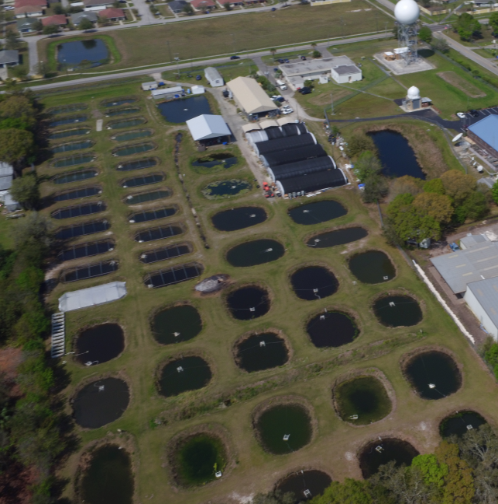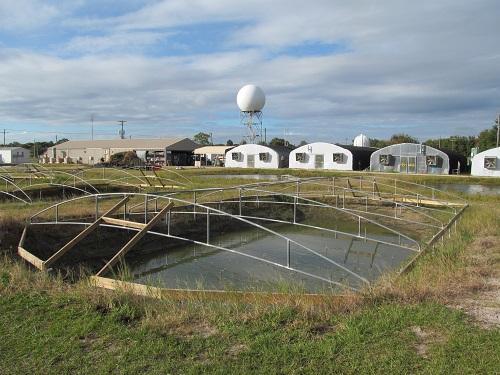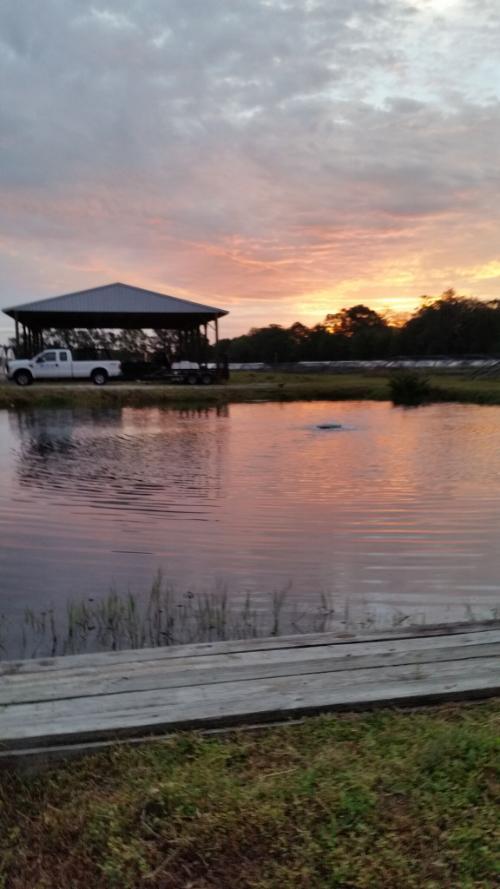
Tropical Aquaculture Laboratory from above

Tropical Aquaculture Lab from the southeast

Tropical Aquaculture Laboratory at sunrise
History & Overview
University of Florida Institute of Food and Agricultural Sciences (UF/IFAS) programs supporting the unique tropical fish farming industry in Florida began in the late 1980’s. While some important research was conducted at the Gainesville campus, most of the effort was focused on extension programs in fish health, pesticide usage, and general production management. Within a few years the industry and IFAS started exploring opportunities together to create a research and extension facility in the heart of the industry, which is the Tampa Bay region. In 1996, using a surplus building from the National Weather Service, an adjacent fish farm that was for sale, and seed funding from the Florida Department of Agriculture and Consumer Services (FDACS), the University of Florida Tropical Aquaculture Laboratory (TAL) in Ruskin was created. Hillsborough County provided clerical help, the Florida Tropical Fish Farms Association (FTFFA) funded a veterinarian and disease lab, and United States Department of Agriculture (USDA) Wildlife Services stationed a regional manager at the lab. From these humble beginnings, the program and facilities have blossomed into today’s internationally recognized powerhouse.
Today’s TAL comprises a 5,000 square foot office and disease lab, where faculty, staff, and students can work, and a meeting/conference room that can seat up to 100 people. Immediately adjacent is a 6.5 acre fish farm with 48 ponds, 5 greenhouses, a fish quarantine space, and a building which houses tanks and lab space for a wide range of projects. Hillsborough Community College utilizes one of the greenhouses for their hands-on aquaculture production facility. Aerated well water, seawater, and reverse osmosis water is plumbed throughout the facility to allow for research in fresh, brackish, or seawater with an unlimited variation available to serve each project’s needs.
As part of the Land Grant mission, the programs at TAL have always focused on research and extension to solve problems or create opportunities and have provided millions of dollars each year in savings or new profits to farms. Working closely with industry and other partners, the faculty, staff, and facilities development have all been strategically planned and implemented. Today there are over 20 UF employees, including faculty, staff, and graduate students at TAL. USDA continues to maintain their Wildlife Services regional programs office at TAL. Additionally, the USDA APHIS Veterinary Service's Senior Staff Veterinarian in Aquaculture Health operates from our facility.
Industry-driven applied research, extension outreach programs, and teaching of future aquaculture leaders are key avenues to achieve our mission of supporting the tropical ornamental aquaculture industry in Florida.
